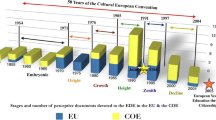Abstract
The principles of ‘double relevance’ and ‘user-friendliness’ are seen as being essential for the implementation of the EU education programmes SOCRATES II and LEONARDO da VINCI II. Against the background of the acquis in EU education cooperation two points are explored: a) the articles of the Treaty are not fully used, and b) the framework set is increasingly proving to be too restrictive. The Luxemburg process and the Bologna conference are the reason for the second point. The opinion is put forward that the exchanges of students and teachers and the information exchange can be further europeanized and, eventually, be organized in permanent European structures.
Similar content being viewed by others
Author information
Authors and Affiliations
Rights and permissions
About this article
Cite this article
Müller-Solger, H. Education cooperation in the European Union at the threshold of the New Millenium. European Journal for Education Law and Policy 3, 111–115 (1999). https://doi.org/10.1023/A:1022988412128
Issue Date:
DOI: https://doi.org/10.1023/A:1022988412128




